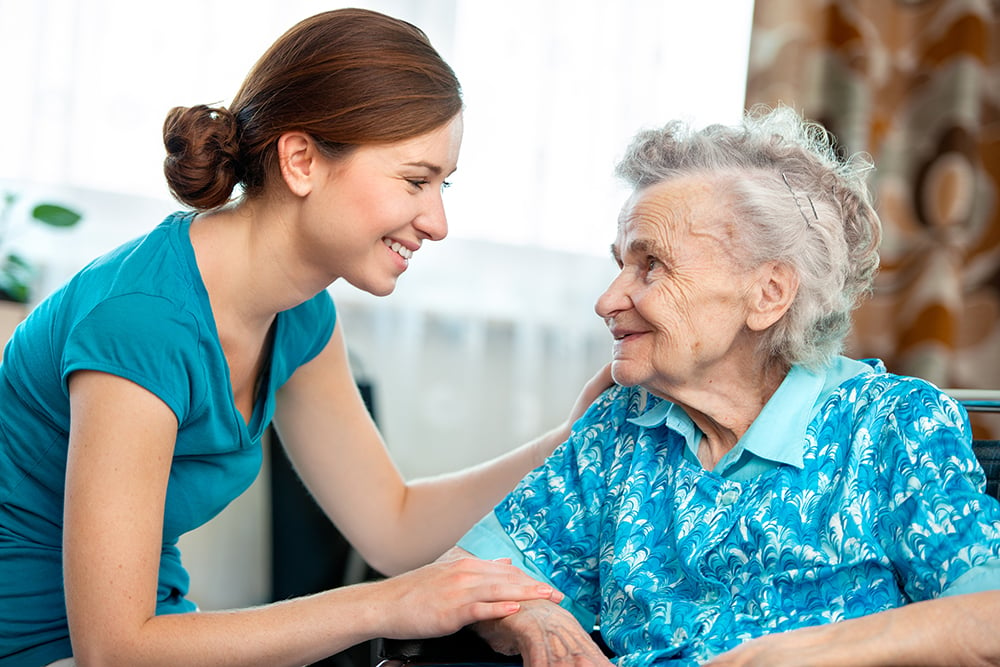How to make caregiver mental health a priority

In a recent article, we discussed common mental health concerns for people with physical disabilities. A related, and sometimes overlooked concern, relates to the loved ones who care for them. Caregiver mental health can decline over time without the proper resources, support and self-care.
Caregiver mental health risks
The emotional burden placed on caregivers can be intense. Often, loved ones take on the responsibility of caring for a family member who has health concerns or physical disabilities. Depending on the circumstances, this caregiver role can be short–or long-term, and many people may not be fully prepared for what the role will entail.
The Family Caregiver Alliance estimates that 44 million Americans offer this type of unpaid care to their elderly family members or those with disabilities, and:
“Evidence shows that most caregivers are ill-prepared for their role and provide care with little or no support, yet more than one-third of caregivers continue to provide intense care to others while suffering from poor health themselves…
A substantial body of research shows that family members who provide care to individuals with chronic or disabling conditions are themselves at risk. Emotional, mental, and physical health problems arise from complex caregiving situations and the strains of caring for frail or disabled relatives.”
The Alliance goes on to cite several alarming statistics, including:
- Up to 70 percent of caregivers show clinical signs of depression; and up to one-half of those individuals show signs of major depression.
- For many caregivers, depression symptoms do not ease after their loved one is placed in a nursing home or care facility.
- Women, as well as people caring for loved ones with dementia, show the most signs of depression and anxiety related to their caregiver role.
- Caregivers are more prone to substance abuse than non-caregivers.
Those sobering statistics indicate a significant problem in our communities. What’s more, caregivers may be reluctant to seek help or care themselves.
Caregiver resources
If you are a caregiver, or if you know someone who is providing care to a loved one, there are a few steps you can take to minimize the strain of the often stressful role. The first step is to make use of the resources available to you, which include:
- Respite care. A variety of organizations recognize that caregiving is often high stress and that caregivers need breaks. Here in Colorado, for example, The Colorado Respite Coalition connects caregivers with respite care options. Adult day centers, senior associations and others also offer respite programs.
- Support groups. Joining a support group for caregivers can help you feel a lot less isolated. Sharing stories with others who are on a similar caregiver journey can help ease your emotional burden. This site lists several caregiver support groups by state.
- Counseling. Whether you are struggling with caregiver depression, stress and anxiety, or you just need a listening ear, a good therapist can help you cope with your role.
- Other support services. Many caregivers go above and beyond caring for the individual and also care for their loved ones’ homes, pets and more. Consider hiring out some of that work to a maid service, dog-walker, handyman or other service provider who can take some of the load off your plate.
Caregiver self-care
Focusing on self-care is perhaps the most important step you can take to prevent caregiver mental health risks. If you are not taking good care of your own physical and mental health, you can’t provide the best care for your loved one. Your health matters and you deserve a break, time to enjoy your life, the company of good friends and more.
So, what qualifies as self care? In short, it’s anything that helps you feel refreshed and helps you enjoy life more. Here are a few ideas to try:
- Eat well. Make time to eat a balanced diet, and be sure to load up on fruits and vegetables. Good nutrition is the foundation for good mental and physical health.
- Exercise. Take a long walk, go for a bike ride, or join a weekly Zumba class. Do something active that you enjoy. It not only supports your physical health, it can be an outlet for stress, and it gives you an hour or so of time dedicated 100 percent to you.
- Visit the doctor. As you work to keep track of your loved one’s appointments and medications, do you neglect your own? Stay on track with your own preventive health appointments.
- Do something fun. Take an art class, go to a concert, or pack a picnic and sit in the park. Fun can take many forms, so what you do is your choice. The point is to bring back a little relaxation, enjoyment and laughter into your life.
- Meditate. Many studies have shown the positive effects of mindfulness and meditation. Even five quiet minutes each day can make a difference. Don’t know where to start? Try a free meditation or download an app like Calm.com.
That list is just a starting point for self-care–there are many other activities and techniques you can try to boost your sense of well-being. The point is to make yourself a priority. As a caregiver, of course, your loved one’s health is top-of-mind, but be sure to place yourself on the priority list.
About the Author:
Scott Kohner MSW, LCSW is a psychotherapist in Denver, CO working with individuals, couples and families. To learn more about Scott, visit www.ScottKohner.com.
1800wheelchair is committed to helping those who help others. Full time caregiving is an essential component to the aging, elderly, and disabled, here are some tips to coping with the stresses.
